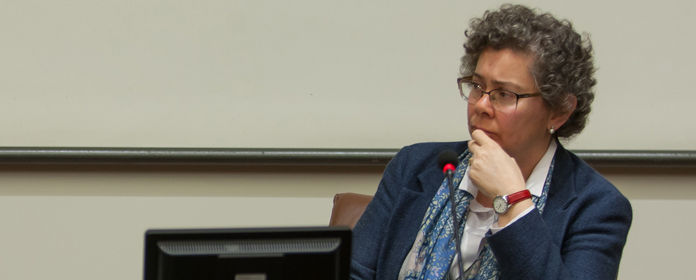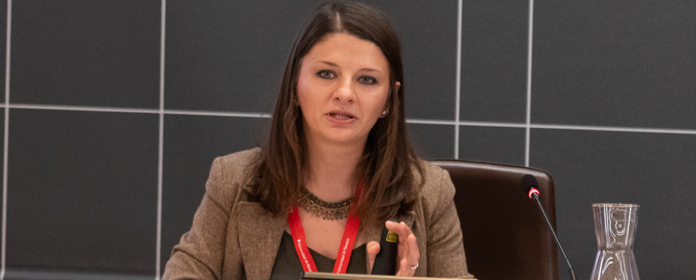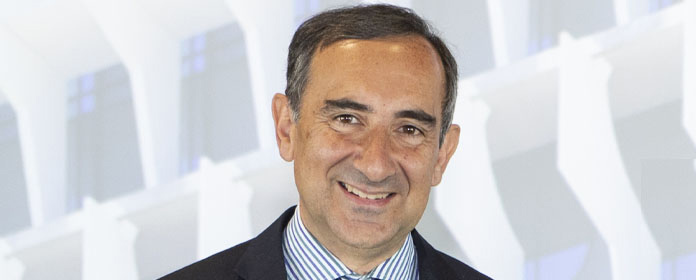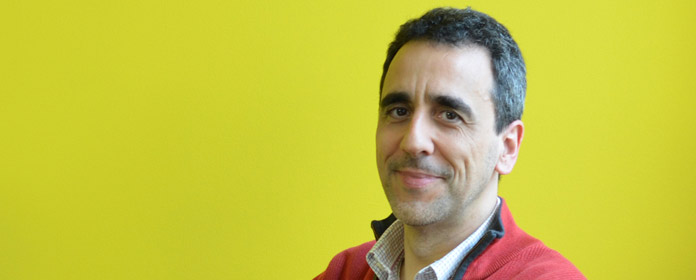The coronavirus, a call to reflect on our social and political model development
Ana Marta González, ICS researcher and professor at department of Philosophy, analyzes in this interview issues such as responsibility staff, the sustainability of our life system and the vulnerability of an aging Europe.

PHOTO: Manuel Castells
Ana Marta Gonzalez is principal investigator of project 'Emotional culture and identity' of the Institute for Culture and Society (ICS) and professor at department of Philosophy of the University of Navarra. In relation to the current status around the coronavirus, she analyzes fundamental issues such as responsibility staff, sustainability and the vulnerability of an aging Europe. She assures that the context challenges us to reflect on our social model and development and creates an opportunity to set a new course.
The coronavirus has practically paralyzed our taken-for-granted way of life. Has it shown us that it is more fragile than we thought?
This is not the first time that our social and operating habits have been suddenly affected by some event. We have a relatively recent example in the September 11 attacks and, further back in time, the Second World War, which, among many other things, forced a rethinking of the terms of production; women began to enter the workforce because men were on the front lines.
It is true that COVID-19 has altered our normality, raised questions and made us reflect not only on how we function, but also on more existential questions. For example, to what extent do our vital coordinates depend on social normality?
What changes are we already seeing?
Some operational changes are likely to become new habits. For example, there have been calls for teleworking, although not all work sectors are in a position to adapt to this requirement. Undoubtedly, what we are experiencing will be a stimulus in that direction.
It also forces us to think about the ambivalent meaning of globalization. On the one hand, it relies on communication technologies, which to a large extent are also helping us to cope with this crisis; on the other hand, the mobility of people that a globalized world fosters is also an accelerating element of the pandemic. And in this we could see one of the ironies of fate: the borders that we have unfortunately erected against immigrants, arguing that our health, labor and economic system cannot cope with their arrival, have been easily breached by a virus. The pandemic that causes stress to our health system will force us to make reforms, which hopefully will serve to have a more humane approach to development and globalization. Although right now the focus is obviously on dealing with the crisis, the coronavirus challenges us to review our social model and also that of development.
What should we be aiming for?
We have been living at an accelerated pace in all areas for some years now. For example, we insist on traveling around the world to meetings where we could be present virtually. It would be necessary to see why we do not choose this option in the first place when physical presence is not indispensable, considering that technology puts solutions at our fingertips.
I am a supporter of face-to-face classes and face-to-face communication, but perhaps there are issues to review in order to align ourselves with the need for a more economically and ecologically sustainable life.
But this is not new, is it?
For years, people have been pointing in this direction: our model way of life, the one we lead in the West and export everywhere, is not sustainable. We must remember that people do not travel with the same ease or at the same speed as capital and goods. In fact, they impose different conditions. In the wake of the pandemic, Donald Trump has banned for a month the entrance to people from the European Union, not to goods. The globalization of markets should not forget this asymmetry between people and things, which is at the root of many economic and social dysfunctions. The coronavirus crisis may constitute a turning point in the way of dealing with the globalization of markets and communications. Interconnectedness alone does not bring solidarity or humanity.
Is society prepared to assume this exceptional status and the flexibility it demands?
In one of his speeches, the Spanish Prime Minister used an expression that has not gone unnoticed: 'discipline social'. These words come in response to the information that many media have picked up, about people who, instead of staying at home as recommended by the authorities, have gone on vacation. This behavior class shows a notorious lack of harmony with what is happening on a social level. Although fortunately we are not in a war scenario, we are in a status of social alarm, and we must know how to recognize it as such.
In that sense, China, a non-democratic country, has been more able to control the movements of its citizens. Do human beings only obey when there is a firm threat from the authorities?
This subject of situations puts to test our capacity to act responsibly staff, and, to that extent, constitutes a touchstone of the moral health of democratic societies: ideally we should be able to act responsibly staff without the need to use coercive measures. That is why it seems important to me to review one's own attitude, so as not to endanger vulnerable people. This shows to what extent a person lives in the common world or, on the contrary, in his or her own world. It is a good time to review to what extent concepts such as 'solidarity' have real meaning in our lives. The staff healthcare is responding at the highest level and this has to be matched by an attitude manager on the part of the population so that the healthcare system does not collapse.
What is the submission of healthcare professionals teaching us in the face of the pandemic?
One of the issues that are currently being highlighted the most is the care that the staff healthcare is providing to the sick, and the discipline and dedication with which they are carrying out their work work. This also gives us food for thought: jobs with a strong relational load, which require discernment and creativity, cannot be replaced by machines. We appreciate efficiency and productivity, which could eventually be replaced by machines, but human society also relies on other values. Perhaps we need to think of a social model that does not rest so exclusively on a vision of work modeled on the productive work , and that instead incorporates other human elements such as creativity, the ability to form bonds... I understand that right now the priorities are other, but I cannot help thinking that here also hides an invitation to think of a social model that reflects the crucial importance of these jobs, whose value is not adequately measured with money, and that instead enhance the sense of identity and solidarity. At final, it is a matter of realizing that there is a currency other than money in circulation, and of promoting a social model that pivots on the more specifically human benefits of work.
The merit given to healthcare professionals contrasts with the lack of capacity of our political leaders to generate tranquility, credibility, confidence... What role should they play in this crisis?
Respect for the activity of healthcare professionals is unquestionable and the public's trust in them should be valued at work. But their work must be supported by sound political decisions. Policymakers are trying to strike a difficult balance between health and Economics, since everything seems to indicate that the latter will be greatly affected. With our patterns of economic operation, such a status will generate a major crisis.
Indeed, the figure of the politician is devalued in the eyes of public opinion, but this is nothing new. In a way, every crisis that arises is one more argument for this perception to be accentuated. Our leaders do not set the guideline, but generally observe social trends and get ahead of them. It is certainly not easy to govern complexity, and it is easier to criticize any decision that is made. In any case, to have the courage to make the right decisions, at the right time, one must discern what is, in fact, the right time. And this, in turn, requires having clear priorities and the opinion of experts in the matters most directly concerned here -health and Economics.
Finally, do you think that our resilience will not only allow us to get out of this status but also to generate a constructive reflection on our future?
External events can be a stimulus for reflection, but only when a person has a certain disposition. Ludwig Wittgenstein wrote his philosophical thoughts at the height of the world war, with the world collapsing around him. Right now there are people abandoned to the last minute of social networks; this state of permanent distraction is not conducive to reflection. As I said earlier, if your life coordinates depend on a social normality - shopping, going to bars, hiking... - what are you left with when these options are not available?
In this respect, Europe is very vulnerable from a psychological point of view. Although it has experienced the effects of recent conflicts such as the war in the Balkans or the migration crisis, it has not experienced status of this scale and extent since the Second World War. Many places in the world regularly face situations of emergency and violence. Although we are currently at the epicenter of the pandemic, our challenge is to ensure that the system does not collapse. Our next challenge will be to return to normalcy, and hopefully we will do so with a little more wisdom.
In a sense, the coronavirus pandemic is an unexpected crossroads, for it gives us an opportunity to pause and reflect on the personal and social habits that we could change, that we should change, to make the world a little more humane.




